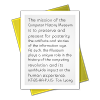Title
Johnson, Brig. Gen (Ret.) Johnny (Harold Richard) interviewCatalog Number
102738128Type
DocumentDescription
Contributed by James Pelkey:In 1954, Captain Harold Richards “Johnny” Johnson was put in charge of developing a General Operational Requirement (GOR) for Air Force communications for the Air Force Communications Service (AFCS). On his staff was an engineer, Bill Pugh, who established that a suitable goal would be 10,000 bits per second in a voice band. In 1955, 56, they proposed such a goal in the GOR that became the research document for AFCS to provide an integrated worldwide communications system for the Air Force. Later, Johnson was assigned to the White House doing policy work on satellite activities. In 1968, Johnson was promoted to Brigadier General and moved to Hawaii were he was Commanding General of the Air Force Communication Center in the Pacific. He then decided to retire and go to work for the Western Union Telegraph Company as Assistant Vice-President of Government Systems located in Washington D.C. He was promoted to Vice-President and later Group Vice-President, almost all that time working on their Westar satellite system until it was launched in 1974. Next, Johnson became Vice-President of Marketing after Western Union decided they couldn't afford the group-organizational structure. He left Western Union at the end of 1976. In 1977, Johnson joined Fairchild Industries as Vice-President of Marketing with their internal start-up American Satellite. In September 1980 he was recruited to be a founder of Vitalink Communications, to provide private satellite communications, where he stayed until late1983. In January 1984, Paul Baran and Steve Millard, the co-founders of Telebit, recruited Johnson to be President of their start-up. He served as President until he returned to Fairchild Industries in 1988.
I first met General Johnny Johnson in the fall of 1984 when Telebit was circulating an Investment Memorandum. It would be one of the first investments my team and I made with the venture capital funds of Montgomery Securities. Johnny and Paul Baran were very persuasive and we decided to lead the Round of financing and I joined the Board of Directors. That was the start of my relationship with Johnny, and although it began very smoothly, after a few years we began to have our disagreements, largely around Telebit’s performance, or more precisely lack of performance, to plan. Johnny returned to the more comfortable confines of Fairchild Industries in 1988.
Date
1988-05-03Contributor
| Johnson, Harold Richard, interviewee |
| Millard, Steve, editor |
| Pelkey, James L., interviewer, editor |
Publisher
Computer History MuseumPlace of Publication
Cupertino, CAExtent
13 p.Format
PDFCopyright Holder
Computer History MuseumCategory
TranscriptionSubject
Telebit; Baran, Paul; Fairchild; United States Air Force; Vitalink CommunicationsCollection Title
James L. Pelkey collection : history of computer communicationsCredit
Gift of James PelkeyLot Number
X5671.2010Related Records
| 102746648 | James L. Pelkey collection : history of computer communications |


